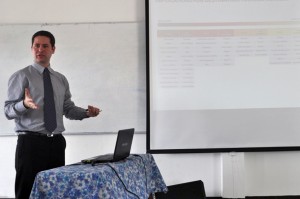As recent graduates from Tourism Destination Management of NHTV, Philipp and I have put together our interest in tourism and the Asian continent by getting involved in the tourism industry and the academic field in this side of the globe.
In last October, we were invited to participate in the 2nd Anniversary Celebration of the University of Savannakhet (SKU), in central Laos. This was their first conference of this kind, and it intended to gather academic researchers from Laos, Vietnam and Thailand to discuss, share ideas and present papers in different areas such as Agriculture, Human Development and Tourism, among others.
In this occasion, Philipp and I were the representatives sent by the Faculty of Tourism of the University of Hue, Vietnam. We decided to take the topics of our Master thesis to create an interesting presentation for the Lao tourism students and invited professors: Philipp presented about Interpretive Approach in Tourism Research, and I spoke about Tourism Destination Competitiveness. It was an interesting experience – despite some language issues – to be able to interact with students and professors from Laos and Thailand, sharing opinions and discussing about tourism. We also met French and Belgian nationals who were involved with tourism and development projects in Laos, and who could provide us with more information about the tourism situation in the country.
Equally interesting was to travel throughout Laos after the conference. Mostly often described as a “sleepy-relaxed-and-off-the-beaten-track” destination, Laos seems to have become the sweetheart of all backpackers who want to escape from the “sold-out” neighbouring destinations, like Thailand. As tourism researchers, however, we realized that some Lao destinations have been facing an uncontrolled growth of tourism activity in some specific areas, mainly on the route from Vientiane to Luang Prabang. With a cup of coffee or a Beer Lao in hand, many locals have also shared with us the negative effects of tourism in their villages, towns and in their lives.
In a country with almost no industries and a major low-income population, tourism can indeed be a great alternative to create development and improve the life standard of its local residents. We, as tourism researchers and avid travellers, can only contribute to and hope that Laos will find the best way to benefit from it!













Leave A Comment